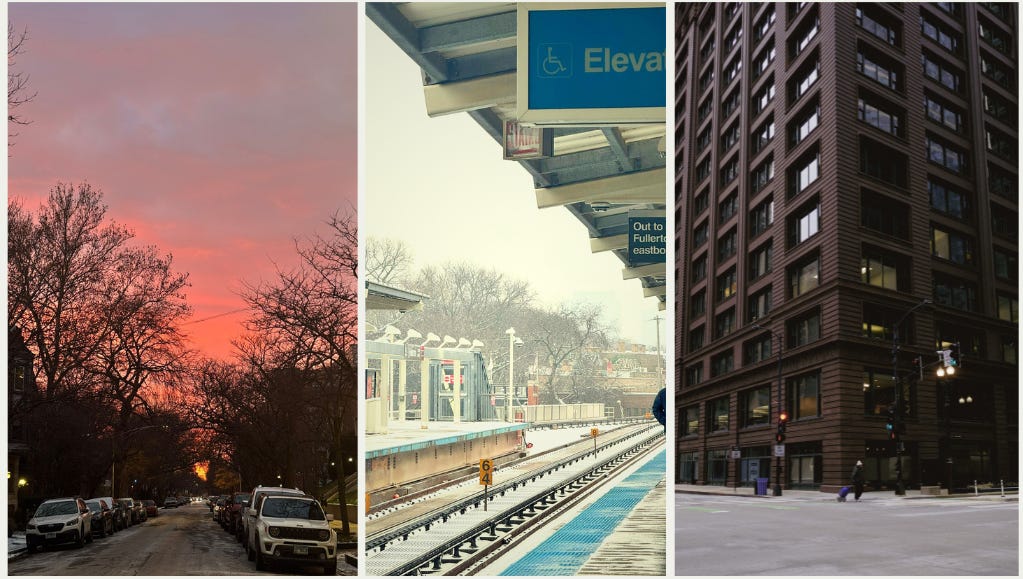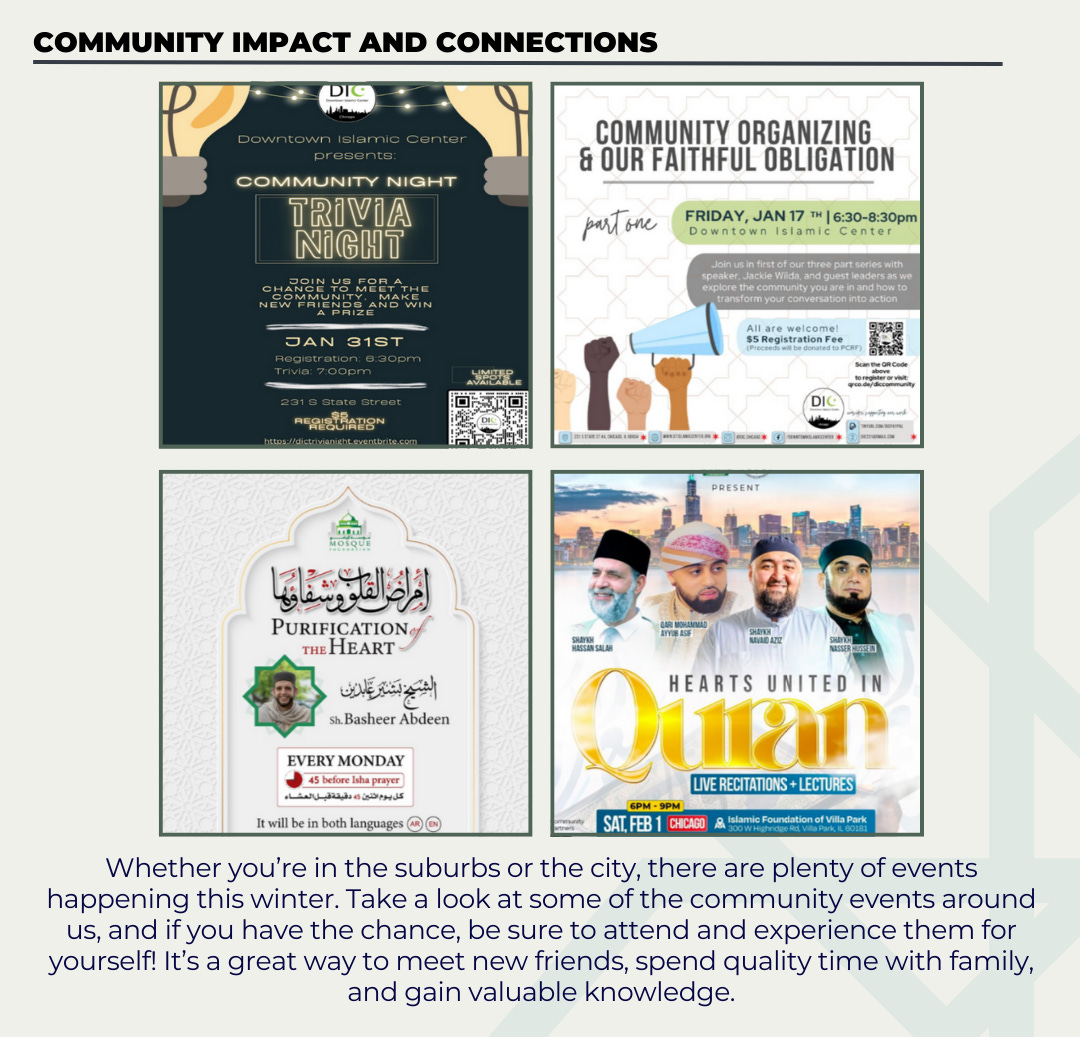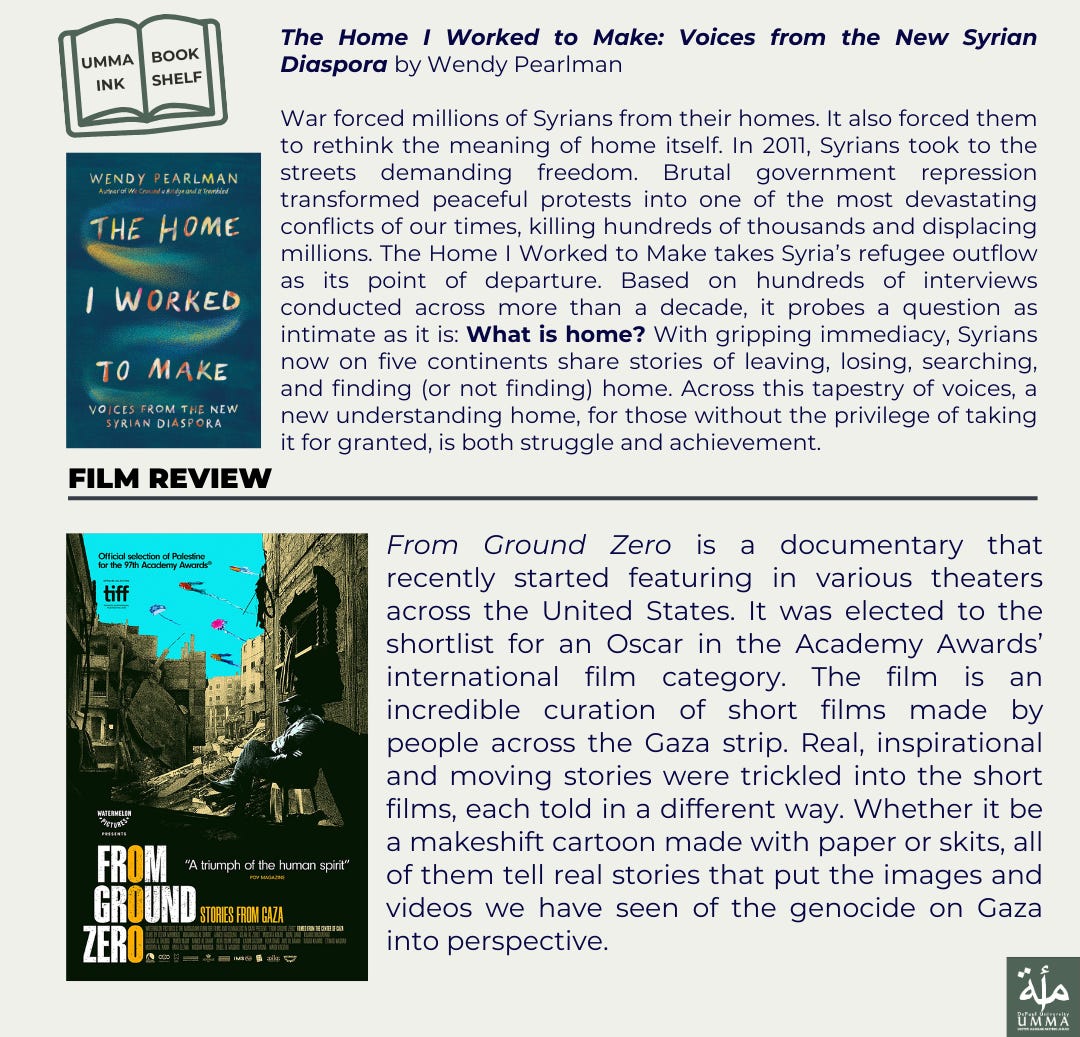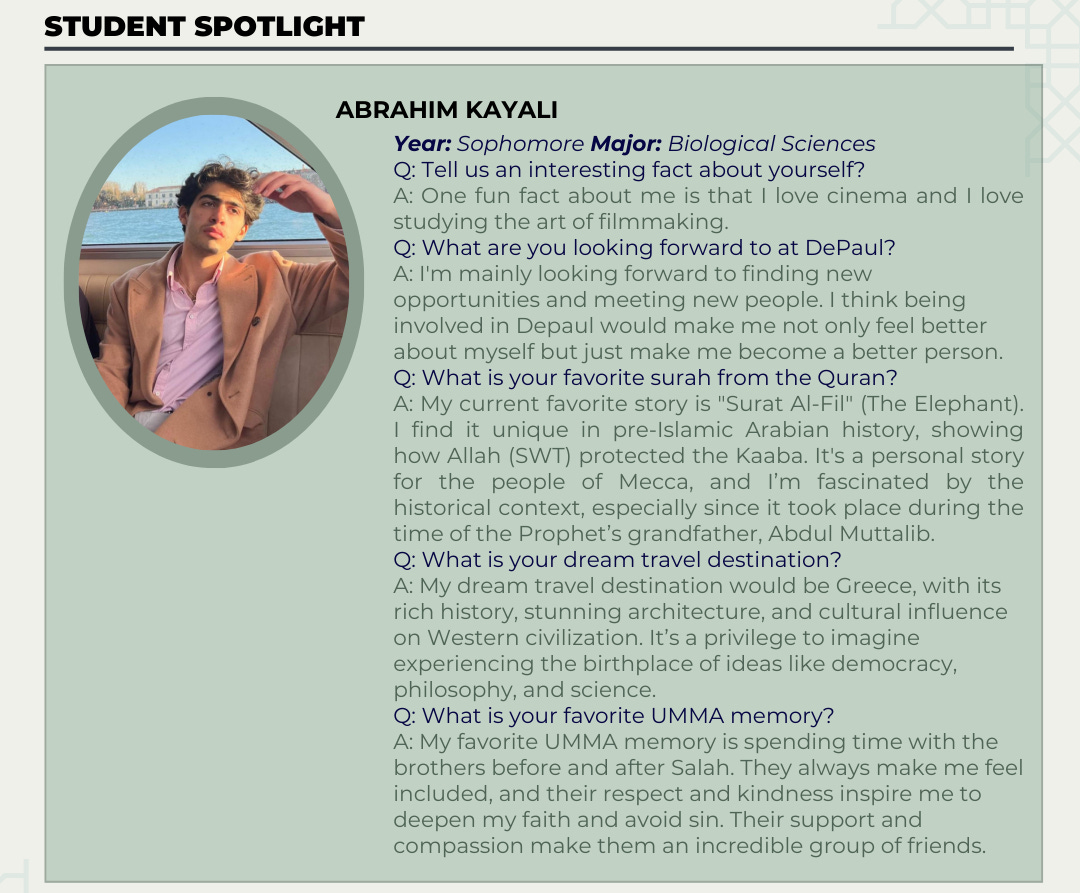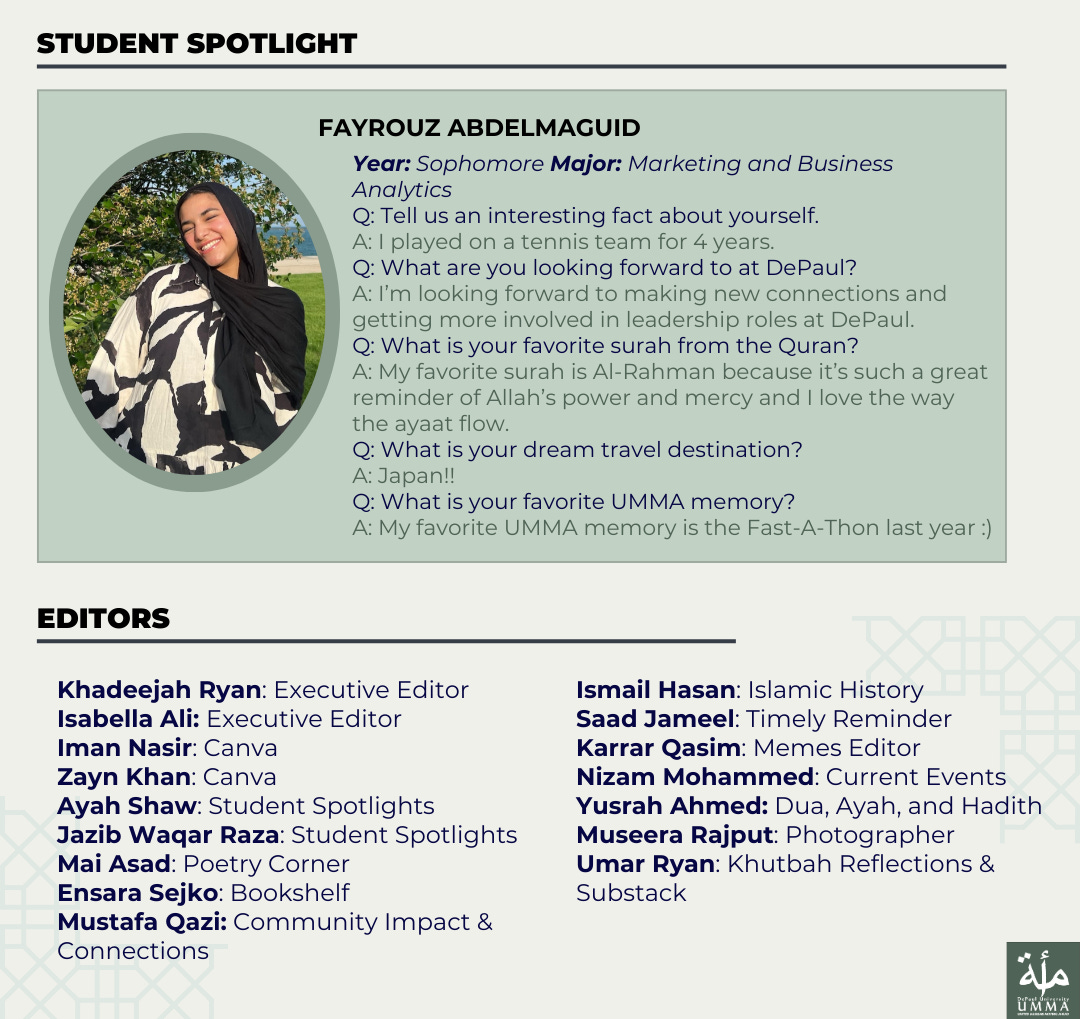Volume 6 Issue 5
UMMA Ink is back! We hope everyone enjoyed the break and is settling into the new quarter and staying warm!
Salaam everyone! We hope your winter quarter is off to a great start and you’re staying warm and healthy! As Ramadan quickly approaches, make sure you are setting intentions and goals for this blessed month. Keep an eye out for upcoming UMMA events and as always stop by the room for daily prayers and weekly educational classes.
-The UMMA Ink Team <3
Islamic Timely Reminder
During the kutbah today at my local masjid, the Khateeb made a great comparison between the Prophet Muhammad ﷺ and Prophet Yunus A.S. The first mention of a Prophet in the revelations received from the Prophet Muhammad ﷺ is about Prophet Yunus A.S. The kutbah mainly highlighted the community of Prophet Yunus A.S. and the community of the Prophet Muhammad ﷺ.
Prophet Yunus A.S. left his community because they persistently rejected Allah’s message and refused to repent from their wrongdoing. This frustrated Prophet Yunus A.S. and he lost hope in his people and left them before receiving Allah’s permission to do so. As most of you know, this led to Prophet Yunus A.S. being stuck in the belly of a whale in complete darkness. Even in this unique and dark state, Prophet Yunus A.S. remembered الله, prayed, made sujood, and repented in a place no man has ever done.
Eventually, الله accepted his repentance and Prophet Yunus A.S. returned to his community. However, upon his arrival he saw that his entire community has accepted Islam. They all repented from their ways. The Khateeb mentioned that this is the only place in the Quran that الله specifically mentions the population of people in a community, which was at least 100,000 people, as الله says, “We later sent him back to his city of at least one hundred thousand people” [Quran 37:147].
This is tremendously significant because throughout the lives of all the Prophets’ and their stories, never once was the population number of their communities revealed by الله, except for Yunus A.S. Also, there have been numerous communities that Prophets were a part of that were destroyed by الله because they rejected the message, but not this community.
This further emphasizes that if a population of 100,000 can come together, regardless of their differences in opinions and matters, and repent to الله then as the Ummah of the Prophet Muhammad ﷺ we can do the same. Rather than focusing on who follows what opinions, what school of aqidah does such and such follow, and looking at differences of opinions, we all need to focus on our belief in الله. We need to focus on repentance. We need to focus on making dua for each other and the Muslim ummah as a whole. We need to focus on ourselves as a Muslim and how we can give dawah through our words and actions.
Allah revealed this early on to the Prophet Muhammad ﷺ because he knew that he ﷺ would face similar issues. The Quraysh, the people around him, and his community rejected his message, and physically, mentally, and emotionally harmed him. The Prophet ﷺ despite that loved them all, and as a result those same who rejected and hurt him became Muslim.
We need to strive to do the same as the ummah of Nabi ﷺ. We cannot lose hope in one another and in ourselves, we cannot cause division and stop our dawah because of fear or rejection because it is only الله who guides people to the straight path. “Even in the belly of a whale there was hope.” “Hold firmly together to the rope of Allah and do not be divided.” [Quran 3:103].
Khutbah Reflections
As we begin a new quarter at DePaul, don't forget that we are also in the month of Rajab, a sacred month in Islam in which we begin to prepare for Ramadan.
In his khutbah, Abu Noor mentioned the importance of preparation and planning in all aspects of our lives, and thinking of how we plan to get closer to Allah (SWT), especially with Ramadan approaching, is no different. Making a plan for your ibadah now, whether it be performing and maintaining fard prayers, increasing sunnah prayers, consistently reading and contemplating the Qur'an, giving more charity, making up missed fasts, or adding sunnah fasts, is a great way to get ahead and ensure you are ready for Ramadan.
In addition, however, we should have a plan in place for how we intend to better our character, speech and interactions with others. While we refrain from committing sins with our hands, we should also be mindful of the harms we may inflict with our tongues. By improving our relationship with Allah and each other, we can bring a sense of balance and peace to our lives amidst the many struggles and hardships we face.
Abu Noor also discussed taubah (repentance), and with it, the story of the companion Ka'b bin Malik. Ka'b was among those who delayed joining the Prophet ﷺ at the Battle of Tabuk. While many others gave excuses to the Prophet ﷺ when he returned, who then prayed to Allah (SWT) for their forgiveness, Ka'b instead spoke the truth. It was declared that he, along with two others, would have to await Allah's ruling on their case. Until then, the other Muslims were forbidden from speaking to them, leaving Ka'b feeling extremely lonely and isolated. Despite this, Ka'b remained steadfast and continued to repent to Allah. Eventually, Allah revealed in Surah Taubah (9:118) that their repentance was accepted, and he was congratulated by the ummah.
Ka'b's story teaches us to always seek forgiveness from Allah, regardless of how hopeless we may feel or how others may treat us, and to be sincere in our repentance. We should also strive to be like the Sahaba, who re-embraced Ka'b after the ruling and did not treat him any differently. Above all, though, the story of Ka'b bin Malik conveys the vastness of Allah's mercy, for He is truly Ar-Rahman Ar-Rahim; the only one who can forgive us.
Ayah
لَا يُكَلِّفُ ٱللَّهُ نَفْسًا إِلَّا وُسْعَهَا
Allah does not burden a soul beyond that it can bear (2:286)
Dua
رَبَّنَا لَا تُؤَاخِذْنَآ إِن نَّسِينَآ أَوْ أَخْطَأْنَا ۚ رَبَّنَا وَلَا تَحْمِلْ عَلَيْنَآ إِصْرًۭا كَمَا حَمَلْتَهُۥ عَلَى ٱلَّذِينَ مِن قَبْلِنَا ۚ رَبَّنَا وَلَا تُحَمِّلْنَا مَا لَا طَاقَةَ لَنَا بِهِۦ ۖ وَٱعْفُ عَنَّا وَٱغْفِرْ لَنَا وَٱرْحَمْنَآ ۚ أَنتَ مَوْلَىٰنَا فَٱنصُرْنَا عَلَى ٱلْقَوْمِ ٱلْكَـٰفِرِينَ
“Our Lord! Do not punish us if we forget or make a mistake. Our Lord! Do not place a burden on us like the one you placed on those before us. Our Lord! Do not burden us with what we cannot bear. Pardon us, forgive us, and have mercy on us. You are our ˹only˺ Guardian. So grant us victory over the disbelieving people.”
Hadith
(صحيح البخاري) لا شيء أثقل في ميزان الحسنات من حسن الخلق
"Nothing is heavier on the Scale of Deeds than one's good manners." (Sahih Al-Bukhari).
Islamic History
The Safavid Empire: Shi'a Islam and Persian Renaissance
The Safavid Empire, ruling Persia (Iran) from the 16th to 18th centuries, stands out in Islamic history for establishing Twelver Shi'a Islam as the state religion, shaping Iran's religious identity and differentiating it from the Sunni Ottoman and Mughal empires. This fostered unity amongst diverse groups within their realm.
Shah Abbas the Great brought the empire to its zenith. He reformed the military, centralized governance, and fostered a vibrant artistic and intellectual scene in the capital, Isfahan. This era witnessed a renaissance of Persian art and architecture, with magnificent mosques, palaces, and gardens showcasing the distinctive Safavid style with intricate designs and vibrant colors.
The Shah Mosque in Isfahan exemplifies the era's architectural achievements. Miniature painting flourished, with artists like Reza Abbasi creating exquisite works. Carpet weaving reached new heights, with intricately designed carpets becoming prized possessions across Eurasia. This cultural flourishing, combined with political and economic strength, fostered a renewed sense of national pride and identity among Persians.
Though the empire declined in the 18th century, its legacy endures in Iran's religious makeup, architectural marvels, and rich artistic traditions. The Safavids shaped Iranian history and contributed significantly to the broader tapestry of Islamic civilization.



